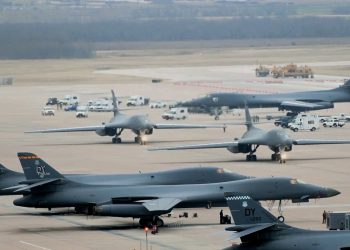AGENCE FRANCE-PRESSE,
Taipei (AFP): The Taiwanese military confirmed Tuesday that it was setting aside funds for the purchase of a fleet of US-made F-16 fighters, a deal that has angered Beijing.
“The budget for F-16s has been budgeted in the next fiscal year,” said vice defense minister Vice Admiral Kao Kuang-chi at a press conference to unveil the 2006 National Defense Report.
Kao offered no details of the deal, but local newspapers have said Taiwan is planning to replace its outmoded F-5 fleet with 66 F-16C/D Block 52s at a cost of at least 100 billion Taiwan dollars (3.1 billion US).
The new planes aim to reinforce the air force's combat capability before it can acquire so-called “third generation” fighters from the United States, the papers said.
The United States agreed in 1992 to sell Taiwan 150 less sophisticated F-16A/Bs, but refused to provide F-16C/Ds which have a longer range and powerful ground attack capability.
In addition to some 60 F-5 Tigers, Taiwan's air force consists of so-called “second-generation” aircraft — 146 less sophisticated F-16A/B fighters, 128 locally produced Indigenous Defense Fighters and 56 French-made Mirage 2000-5s.
Taiwan's cabinet last week approved a draft bill proposed by the defense ministry calling for 323.5 billion Taiwan dollars in spending next year, a rise of 71 billion dollars, or 28.1 percent, from the current year.
The planned military spending, pending the legislature's final approval, would account for 18.7 percent of the government budget for 2007, up from 15.3 percent the preceding year.
Taiwan's 2006 National Defense Report warned of the threat from Beijing and called for the the purchase of eight conventional submarines, 12 P-3C submarine-hunting aircraft, and six PAC-3 Patriot anti-missile systems for around 340 billion Taiwan dollars (10.8 billion US).
Beijing in July warned Washington not to proceed with the reported deal to sell fighter jets to Taiwan, indicating it would impact on regional security and harm Sino-US relations.
China announced in March its military budget for this year would rise 14.7 percent to 35 billion dollars, the latest in a series of double-digit annual increases dating back to the early 1990s.
A Pentagon report last year estimated that China's defense spending was two to three times the publicly announced figure and that the cross-strait military balance was tipping in Beijing's favor.
China has repeatedly threatened to invade Taiwan should it move towards formal independence, prompting the island to seek more advanced weaponry.








